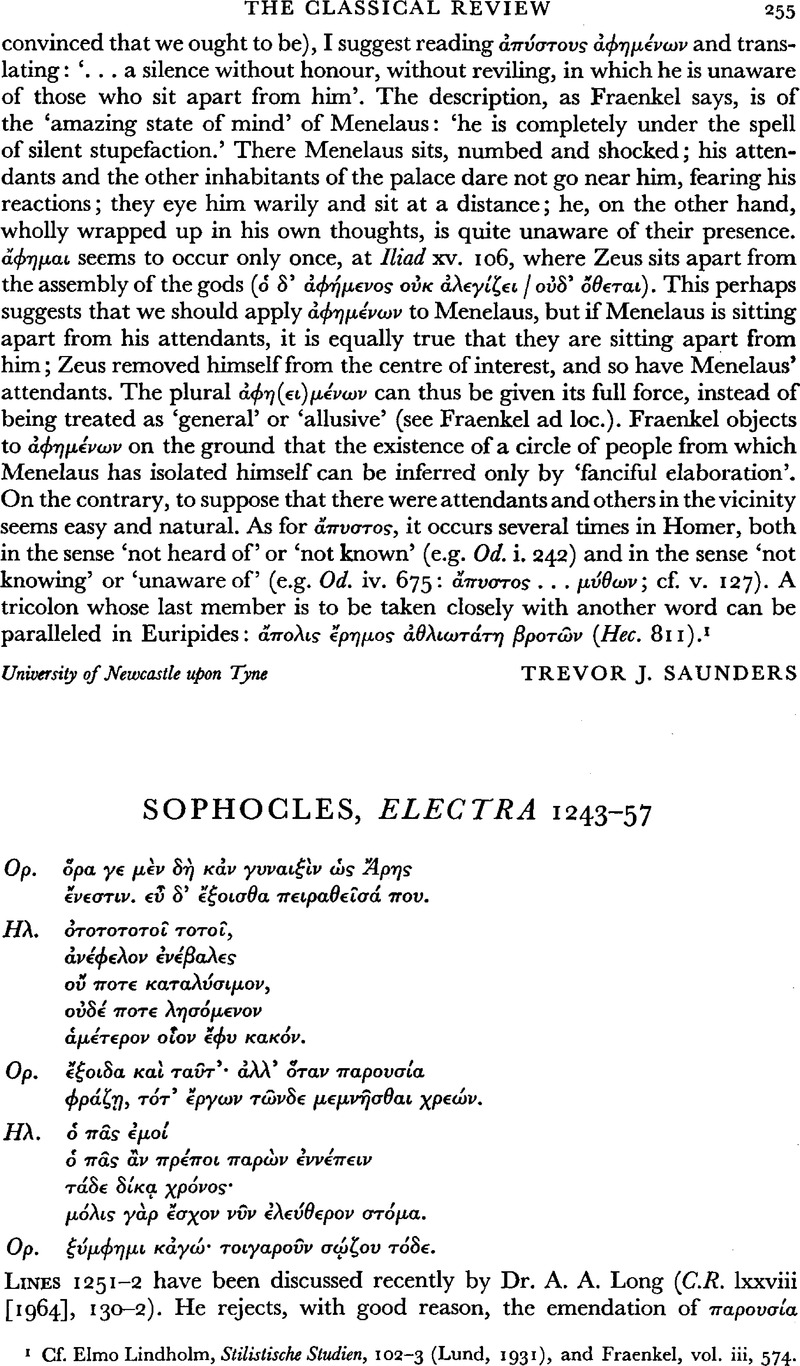No CrossRef data available.
Published online by Cambridge University Press: 27 February 2009

page 256 note 1 The objections to παρρησ⋯α (or παρρησ⋯ᾳ) are, (1) that it is prosaic, (2) that it is the lectio facilior, (3) that παρουσ⋯α is guaranteed by παρών in the reply. If παρουσ⋯α were removed, there would be no point to Electra's παρῗ. But the person who altered παρουσ⋯α to παρρησ⋯α at least did so because he saw the sense that was required, viz. that Orestes is telling Electra to wait till the vengeance accomplished before she expresses her emotions freely: then, and only then, would there be freedom from danger, and therefore ‘free speech’.
page 256 note 2 The connexion between παρουσ⋯α and παρὼν was perfectly understood by Kaibel. He writes: ‘παρουσ⋯α hat keinen Genetiv bei sich, weil Or. sich scheut deutlicher zu reden, El. aber hat ihn richtig verstanden, wenn sie antwortet ⋯ π⋯ς…χρ⋯νος, d. h. “die ganze nur denkbare, mir zu Gebote stehende Zeit, also auch jede einzelne Stunde und Minute ist geeignet davon zu reden”.’ Long admits that there is a connexion between παρουσ⋯ν and παρουσος: ‘Electra takes-up παρουσ⋯α with π⋯ρω (sic) χρ⋯νος, a typical word-play.’ What would be the point of such ‘word-play’, unless παρουσ⋯α, like παρών, refers to time?
page 256 note 3 Cf. 1368 Πα. ν⋯ν καιρ⋯ς ἔρδειν ν⋯ν Κλυταιμ⋯στρα μ⋯νη. The very individuality of Sophocles' plot (in which it is Clytemfreedom nestra who is killed first, and she has remained in or near the palace throughout) rules out Long's meaning of παρουσ⋯α. In the Choe′horoi (where Aegisthus is summoned before the vengeance begins) ‘presence’ matters; and also in Euripides' Electra, where Aegisthus' whereabouts have to be determined before he can be killed, and Clytemnestra has to ‘arrive’ before she can be killed.
page 257 note 1 Despite the editors, I regard λησ⋯μενον as passive here.
page 258 note 1 The emendations proposed (Hermann's να⋯ or Meineke's παῖ for κα⋯, Hartung's καὺτ⋯ς for κα⋯ τα⋯τ᾿) are makeshifts. Campbell translates the text, eccentrically, ‘even so, I know it’. Jebb renders, ‘“these things also”, i.e. the sufferings to which she has just alluded’, but does not say what the other things are.
page 258 note 2 Whitman (Sophocles, p. 170) notices the great importance of ‘time’ in this play.
page 259 note 1 For this meaning of σῴζεσθαι cf. Soph. Track. 682 f. παρ⋯κα θεσμ⋯ν οὐδ⋯ ν, ⋯λλ᾽ ⋯σῳζ⋯μην, / χαλκ⋯ς ὅπως δ⋯σνιπτον ⋯κ δ⋯λτουγραφ⋯ν.